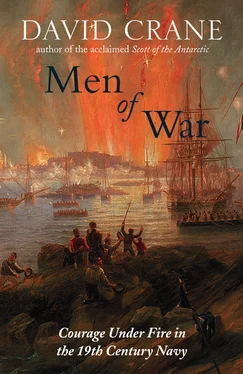The news of the Cambrian reached Tripolis on 30 December, and that night Hastings recorded it in his journal: ‘We were informed that the Greeks had entered Nauplia, & an English frigate of war was in the roads … The Greeks of Tripolitza were in great choler agst the frigate for having insisted upon the immediate embarkation of the Turks & having declared that he would accompany them to their destination.’
It must have been a strange moment for Hastings, a poignant mix of pride, regret and alienation that the ‘choler’ of his new countrymen can only have heightened. There was a twist, too, awaiting him when on 1 January 1823 he made the long, bitter march through more than a foot of thawing snow to Nauplia and found there his old first lieutenant from the Orlando , Edward Scott. His journal does no more than note their ‘great surprise’ at the meeting, but the next day he went on board the Cambrian , the first time he can have been in an English man-of-war since his return from Port Royal more than four years earlier. ‘I went on board and saw Scott,’ he noted. ‘Much difference of opinion existed among the Greeks on the conduct of the English Capt but I feel convinced that he saved the lives of the Turks by his prompt measures & that he did a great service to Greece.’
It had been an unsettling way to see out an old year that had brought nothing and see in a new that promised less. There would come a time when Captain Hamilton would willingly have given a thousand pounds to be in Hastings’s shoes, but as the Cambrian , with its five hundred emaciated Turks, weighed for Smyrna, Hastings could only reflect on how utterly alone he was. He had no Greek friends, and a chance meeting with a party of Germans – some new arrivals, some survivors of the original Philhellene Battalion desperate to escape a country they had grown to hate – was enough to remind him how little he belonged to any philhellene world either. He had, though, thrown in his lot with his adopted country, and he was no quitter. ‘I now resolved to go to Hydra,’ he wrote the day after the Cambrian sailed, and two days later, on 7 January, nine months after his first arrival, he was back among the scenes of his first disappointment.
VII
The uncertainty that surrounded Hastings’s life at the beginning of 1823 was no more than a reflection of the state of Greece itself as it drifted towards the first of its civil wars. His courage in the Themistocles the previous summer had belatedly won him a Hydriot reputation of sorts, but as the stories emerged from the Morea of Colocotrones’s growing power and the endless rivalries – government against captain, captain against captain, captain against primate – an island exile seemed an indulgence that Hastings could not afford if he was ever going to get the chance to fight again.
He had been invited by Emmanuel Tombazi, one of the leading Hydriot captains, to join him on an expedition to Crete, but even that was dependent on decisions taken elsewhere, and in the middle of February Hastings returned to the Morea to be closer to the centre of power. Before he could sail an accident with a pistol almost cost him his head – and did cost him six teeth broken and two knocked out – but on the fourteenth he landed again at Nauplia, setting up house in a half-ruined shelter in the old town while he waited for government and island deputies to arrive for the second National Assembly.
With Colocotrones and his followers quitting Nauplia for Tripolis as soon as the deputies arrived, it was a miracle the Assembly met at all, but by mid-April the warring factions had at last buried their differences sufficiently to converge on Aspros on the east coast of the Morea. On the twenty-fifth of the month Hastings set off after them to fight his corner, and for the next week pitched his tent like some demented Viola in front of the house of the Cretan island’s deputies, ‘halloo-ing’ his cause and credentials until he finally got the appointment he was after as ‘Chef de l’état major de Artillerie’ (sic) on the forthcoming expedition to Crete.
Hastings might have known from the spurious grandeur of his title that he was in for another disappointment, but before the end of May he had sailed along with 1,500 troops and two Germans he had taken into his service at Hydra. On 3 June the expedition disembarked near the citadel of Kisamos on Crete, and within days he was back into the familiar and desultory rhythms of Greek campaign life, with weeks of frustration and inactivity punctuated by sporadic fits of violence and treachery.
The Turkish garrison of Kisamos – ravaged by plague – succumbed without either a fight or the usual reprisals, but from then on it was the old story of confusion, inter-island dissensions, bad faith, broken paroles, massacres, ‘atrocious treason’ and ‘cowardice’. ‘It is plain that they will not fight in a position in which there is a possibility of their being killed,’ Hastings was soon complaining, after his Greek soldiers had refused to sight his batteries in range of Turkish guns, ‘and I cannot persuade them that amongst all the modern inventions there is no secret of fighting without danger.’
The longer he fought with the Greeks, in fact, the more clearly he saw the virtues of the Turks – ‘a courageous and honourable people’ – though one partial exception he would always allow was in favour of the Cretan soldier. ‘A German arrived from Kiramos,’ he noted in his journal:
he says that the quality most esteemed in a soldier here is to run fast. When the gallant Ballasteros * was abandoned by his soldiers & fell into the hands of the Turks who put him to death in the most cruel manner the Greeks remarked that it was no loss as he was worth nothing as a soldier [as] he could not run fast – I must however acknowledge that I [had] a very different feeling at Cadeno [on Crete]. As there was no cannon I took the musquet of my servant & advanced into the valley to a short pistol shot from the pyrgos – the Greeks then used all their endeavours to persuade me to retire saying it was not my business to get killed & that I did not understand their manner of making war & it would hurt them very much to lose me citing with much regret the fate of Balleste – this I must acknowledge gave me a favourable opinion of the Cretans – fortunately for me Tombazi recalled me from this position & thus I was (perhaps) saved from Balleste’s fate.
Hastings could have had no idea of it at the time but it was the last occasion on which he would fight alongside Greek soldiers on land. In the early days of the campaign fever had been rampant in the army, and by 10 August he had joined a mounting sick list, ‘suffering very much’ and the next day was still worse. ‘During the night I was stung by something in my handkerchief,’ he wrote, ‘and on the light being brought I found a scorpion in my handkerchief. The pain tho’ very great lasts only 5 or 6 hours.’
It would be another five weeks before Hastings was strong enough to move, and by that time he would have been grateful for any excuse to quit Crete with life and honour intact. In the early part of September a letter from Edward Scott had warned him of an Egyptian army heading for the Morea, but even before that – before the expedition had even sailed, in fact – a chance meeting with the indefatigable Irish philhellene and serial activist Edward Blaquiere, travelling in Greece on behalf of the newly formed London Greek Committee, had raised possibilities that made the prospect of a foot soldier’s death in a useless war a criminal abrogation of all Hastings’s headiest ambitions.
One of the most puzzling and ill-explained aspects of European philhellenism in the first days of the revolution had been the comparative indifference of Britain to affairs in Greece. In the historiography of the war there have been any number of reasons advanced for this coolness, but whether the answer was domestic politics, Castlereagh or simply some post-Napoleonic species of ‘compassion fatigue’, the truth remains that for all the pamphlets, speeches and moral indignation, no more than a dozen British philhellenes had actually gone out to fight for Greece by the end of 1822.
Читать дальше











